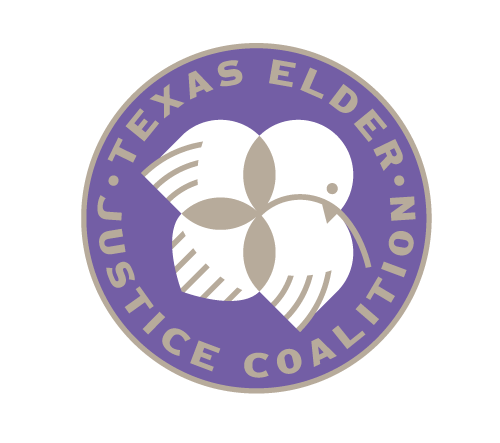Rounding the bend on the first year of Texas Elder Justice Coalition grant
We’ve started planning for one of our big deliverables, the Texas Elder Justice Coalition Summit in Fort Worth, Texas. The theme is: Financial Exploitation: Awareness, Prevention & Action. Make your plans now for a full-day of networking and education in June of 2025. Planned topics include: latest research, cultural implications, overcoming challenges, state and federal resources, coordinating local action and prosecution myths and tips. Contact me with any suggestions, ideas or comments and I will share with the Professional Education committee. Be sure to spread the word with your local and statewide colleagues.
—
Past, present and future collaboration
In October, the Texas Adult Protective Services Conference will be held in Galveston. I hope to see many of you there. Please seek me out to introduce me to others who might be interested in participating in the Texas Elder Justice Coalition or the content we generate for Texas and combatting financial exploitation of older Texans. We need members of all Texas communities to learn how to stop the stigma of reporting incidents of financial exploitation and act. Lyn Scott, CEO, Guardianship Services, Amanda Polk, Policy Specialist, Adult Protective Services and Stephanie McCoy, Faith-Based & Community Engagement Team Lead, Adult Protective Services and I will present on Thur 10/10 at 3:30. Texas Elder Justice Coalition is working to: foster collaboration of private and public stakeholders to develop solutions against financial exploitation of older Texans, and raise awareness of financial exploitation among older Texans and the community. Laying the foundation started with Guardianship Services, Inc. and APS working collaboratively in the community.
Follow link below to sign up and learn more!
More on the 41st Annual Adult Protective Services (APS) Conference.
—
Latest scams/exploitation trends
Help a loved one affected by a scam
Christine Coady’s mother-in-law was terrified when she got the call that her grandson had been in a car crash that injured an undercover police officer. She quickly mailed envelopes filled with cash and sent more money via wire transfers for what she was told was bail, hospital bills, even a wheelchair ramp for the cop’s house. Sadly, it was a scam that ended up costing her $90,000.
She’d been told to keep quiet, but her family realized something was wrong when she kept texting her grandson to ask if he was OK. “Her biggest regret is believing that need for secrecy,” says Coady, 62, who volunteers with the AARP Fraud Watch Network. “I’ve learned that many victims carry shame and embarrassment on their own, not telling anybody.”
Supporting an aging loved one during or after a scam can break through their isolation, bolster their mental health, protect their assets and perhaps even lower their risk for future fraud, says Marti DeLiema, a University of Minnesota-Twin Cities gerontologist who studies financial scams and older adults. Too often, relatives blame the person who experienced the scam, try to take over or withdraw in frustration, she says.
“The emotional impact of fraud is significant, especially when somebody has lost a lot,” says Kathy Stokes, director of fraud prevention programs with AARP. “When the family is supportive, it makes a fundamental difference.”
Fraud experts say these strategies can help you support a victimized loved one:
- Skip the blame and shame
One in three Americans think scam victims are largely responsible for their fate, according to AARP survey data. Victim blaming could make your parent clam up instead of telling you their story and letting you help.
Best strategy: “Think about it not as something Mom and Dad did wrong, but about their intent,” Stokes says. “They were trying to help out a relative (grandparent scam) or accumulate money they could pass on as generational wealth (lottery scam).”
- Listen with compassion
In a 2017 study from the Stanford Center on Longevity, older people felt embarrassed, angry, violated, confused and even suicidal about falling victim to scams.
Best strategy: Don’t begin the conversation on the offensive with “Come on. This is obviously a scam. What are you doing?” suggests Kim Casci-Palangio, director of a peer support program for romance scam survivors with the Cybercrime Support Network. “Gain trust and learn more by asking open-ended questions and listening,” she says.
Understand their fears about opening up. Just 52 percent of older scam victims told family or friends about the fraud, according to DeLiema’s study. Embarrassment is one reason; older women and men may worry they’ll lose their financial independence and the freedom to use their phone, email and social media if well-meaning adult children take over.
Best strategy: Bolster financial protections and privacy settings together. Discuss setting up new phone numbers, email addresses or tighter social media privacy settings. Ask about adding yourself or another close relative as the “trusted contact person” on their investment and bank accounts, the Consumer Financial Protection Bureau recommends. Upgrade your own protections and talk about what you discover, Casci-Palangio suggests. “I guarantee that by assisting their loved one, they’ll uncover safety measures that they didn’t know about or hadn’t implemented yet themselves.”
- Help out with scam reporting — and explain why it matters
Fifteen percent or less of scam victims reported the crime to their bank, credit card company, law enforcement or a consumer protection agency, DeLiema’s research found. “In general, victims feel better when they’ve made a report,” Casci-Palangio says. “But there are all kinds of barriers, including shame, not knowing where to report or going to local law enforcement and hearing there’s not much they can do.”
Better strategy: Offer to help with reporting to financial institutions, police, consumer protection groups and government agencies. Be honest about the outcome, Casci-Palangio says. Victims may not recover their financial losses, but their information could help uncover a fraud trend in time to warn others.Have questions related to scams? Call the AARP Fraud Watch Network helpline toll-free at 877-908-3360. For the latest fraud news and advice, go to aarp.org/fraudwatchnetwork.
—–
By Sari Harrar. Sari Harrar is an award-winning reporter and contributing editor to AARP publications who writes on health, public policy and other topics.
Published June 30, 2023
For original article: https://www.aarp.org/money/scams-fraud/info-2023/supporting-loved-ones.html
—
August Presentation: Lone Star Synergy: Collaborative Approaches to Elder Justice in Texas, Brad Cannell, PhD, MPH
Dr. Cannell started with a generous acknowledgement of the partnerships in the community and how those partners help him do his job effectively and welcomes ideas on ways to work together or address issues. He also explained that what he does as an epidemiologist focused on older adults. An epidemiologist studies the distribution and determinants of disease at the population level. In particular, Brad researches chronic disease or conditions that affect the well-being of older adults.
He worked with the Fort Worth Safe Communities project that was focused on mistreatment of older adults which used MedStar to address underreporting by leaning on emergency care technicians to screen older adults and report mistreatment.
Partnerships with academics can help organizations with grant funding, research and publishing as well as growing public awareness and education of challenges, research and solutions in the community.
Universities are a great resource for finding potential student workers who are interested in the particular aspect of an organization.
They can also assist with program development and evaluation and long-term partnerships.
Presenter: Brad Cannell, PhD, MPH (he/him/his), Associate Professor Elder Mistreatment Lead, UTHealth Institute of Aging; Director, Research Informatics Core, Cizik Nursing Research Institute, UTHealth Houston | McGovern Medical School; Joan and Stanford Alexander Division of Geriatric & Palliative Medicine
Watch presentation on Youtube.
—
Upcoming meetings
September monthly meeting
9/11/24 2-3pm
Speaker: Andrea Earl, AARP, on upcoming Legislation
October monthly meeting
10/9/2024 2-3pm
Speaker: Amy Allen, Legal Aid, on Legal Aid Resources
Click here to join the meeting on Microsoft Teams
Meeting ID: 262 864 068 674 Passcode: LwgXJt
—
Invite your colleagues to join our monthly meetings.
Texas Elder Justice Coalition (TEJC) is dedicated to safeguarding older Texans from financial exploitation and asks individuals and organizations to take the pledge to Stop the Stigma so that older adults, their families, neighbors and caregivers feel safe to come forward and report any instance of suspected fraud or scams as soon as possible.
If you received this newsletter from a colleague and would like to sign up for more information, sign up by visiting https://txelderjustice.org/join-network/
or contact Dana Hoffman at dhoffman@txelderjustice.org
###

